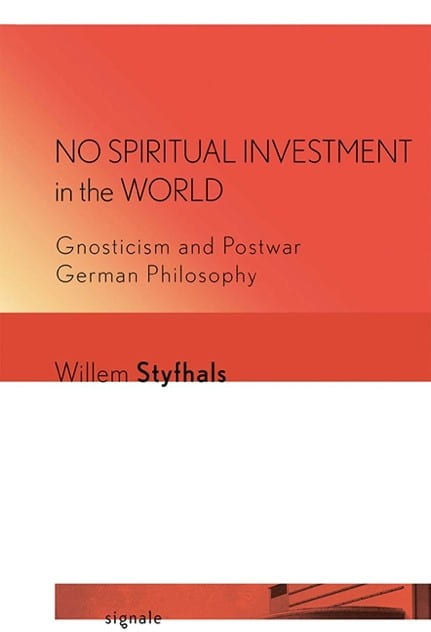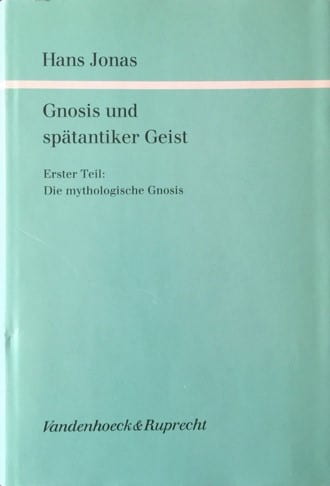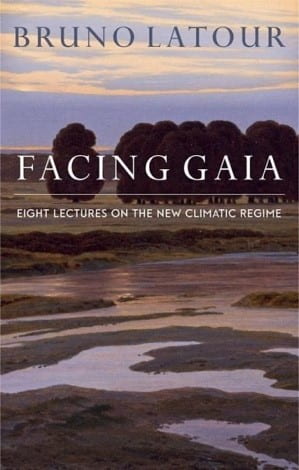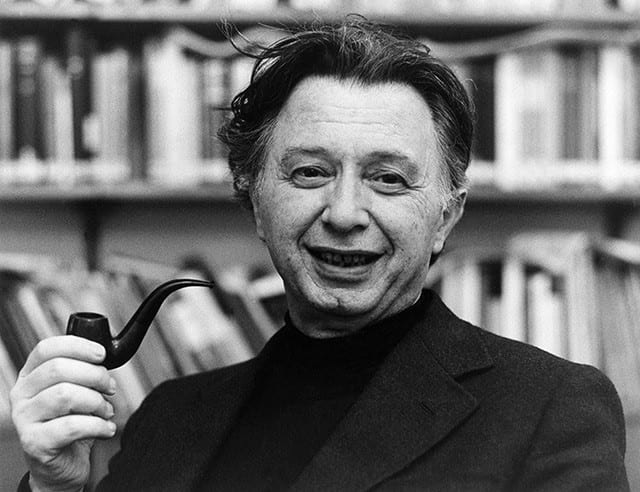Willem Styfhals is a postdoctoral fellow at the Institute of Philosophy at KU Leuven, Belgium, and the author of the new book No Spiritual Investment in the World: Gnosticism and Postwar German Philosophy (Cornell, 2019; see Amazon and JSTOR). Bridging philosophy of religion and intellectual history, this work tells the unexpected story of how certain ancient heretical religious ideas became the subject of heated debates that animated postwar German thought. Earlier versions of two chapters were published in the Journal of the History of Ideas as “Evil in History: Karl Löwith and Jacob Taubes on Modern Eschatology” (2015) and “Modernity as Theodicy: Odo Marquard Reads Hans Blumenberg’s The Legitimacy of the Modern Age” (2019). Styfhals is also co-editor, with Stéphane Symons, of Genealogies of the Secular: The Making of Modern German Thought (SUNY, 2019). Contributing Editor Jonathon Catlin interviewed him about his new book.
Jonathon Catlin: The title of your book comes from the writings of the eccentric Austrian-Jewish philosopher of religion Jacob Taubes, who trained as a rabbi. He once characterized his own apocalyptic and nihilistic attitude, in a reflection on the Nazi jurist Carl Schmitt: “Let it all go down. I have no spiritual investment in the world as it is.” You argue that this phrase indicates both Taubes’s modern atheistic materialism and his religious attachment to another world to come. How do these seemingly exclusive commitments come together in his thought?
Willem Styfhals: Taubes included this quote in English in a text he wrote in German. I like to think of it as a kind of catchphrase he introduced for his own thought. It also captures what interested me in German debates on Gnosticism: a surprising interaction between religious heresy and secular modernity. If you read the quote from a religious perspective, you end up with a Gnostic worldview that completely rejects any immanent meaning of this world in favor of a world to come. This Gnostic world is an evil one from which God has withdrawn, hence there is no reason whatsoever to spiritually invest in it. If you read the same quote from a modern, atheistic point of view, you end up with nihilism. This world is devoid of meaning, devoid of the divine and does not deserve our spiritual investment. Now, Taubes’s point is—and this is precisely what fascinated me—that there is ultimately no real difference between the religious attitude of the Gnostic and the attitude of the modern nihilist. Modernity and modern nihilism, for Taubes, are nothing but the continuation of certain marginalized and heretical religious ideas. This not only implies that modernity secularizes certain theological contents, as thinkers like Schmitt had already claimed, but also that some age-old religious ideas, in particular heretical ones, are more nihilistic and more “modern” than we would initially expect.

Gnosticism and Postwar German Philosophy. Cornell University Press, 2019.
JC: Your book traces the important role of Gnostic ideas in twentieth-century German thinkers including Taubes, Eric Voegelin, Hans Blumenberg, Hans Jonas, Odo Marquard, and Gershom Scholem. In this milieu you assign Taubes a “mediating role” for his efforts to try “to bring their different positions together into a unified debate,” though he often failed in this task. In what ways were these thinkers in conversation—reading, correspondence, conferences?
WS: My book is a history of a debate that never took place—an admittedly problematic but philosophically interesting Auseinandersetzung [confrontation and engagement]. The topic of Gnosticism was omnipresent in German thinking about political theology and secularization, but it was never “debated” in the strict sense of the word. Probably the topic was too vague, haphazard, and idiosyncratic to be discussed in clear theoretical terms. Gnosticism was more of a topos that many thinkers incidentally turned to than a genuine historical or philosophical concept. There was only one figure who wanted to turn the issue into a real academic discussion, namely Jacob Taubes himself. The others never really framed their references to Gnosticism as a systematic intervention in a debate about the Gnostic nature of modernity. That being said, most thinkers I discuss did know each other personally; they read each other’s work and corresponded. Taubes knew all the others rather well, although he quickly made Blumenberg and Scholem into his enemies. Blumenberg also corresponded with Jonas, Scholem and Marquard. The correspondence between Blumenberg and Taubes was published a few years ago and was an extremely important source for the book. The publications of the correspondences between Taubes and Scholem, and between Jonas and Blumenberg, are still in the pipeline. Nonetheless, these thinkers did not extensively discuss the topic of Gnosticism in these letters in the way I tried to oppose or compare their positions in my book. The book brings together certain thinkers and positions in a way that Taubes would have liked to in real life but ultimately failed to realize.
JC: Bridging the religious-secular divide between these thinkers, you write, “the Gnostic-apocalyptic lack of spiritual investment in the world survives in the attitude of the modern nihilist.” This was the view of Hans Jonas, the leading scholar of Gnosticism, whose intellectual trajectory exemplifies the historical pattern established in your book: Pre-war and interwar fascination with Gnostic ideas as solutions to the crisis of modernity—as seen in Jonas’s 1934 dissertation—transformed, after the war, into seeing Gnosticism as illegitimate, “a dangerous herald of modern nihilism.” (Taubes is the exception to this pattern.) First of all, is this critique fair? Was Gnosticism discredited by its secularized legacy? Secondly, this also brings in Blumenberg’s twin critique of the secularization thesis found in Jonas and Löwith, and of Gnosticism itself, and his alternative and “legitimating” genealogy of modernity and progress through a different course than secularized Christian eschatology: “The modern intervention in nature was merely an attempt to make life possible and bearable in a world that is indifferent to human aspirations.” Blumenberg, I would say, emerges as the victor of your story. By legitimating secular modernity, he overcame both Gnosticism and the Gnosticism debates. How did Taubes bring these two debates together, holding onto Gnostic “ontological pessimism” in light of Blumenberg’s critique of the secularization thesis?
WS: Jonas’s critique of Gnosticism and its legacy in modernity—as well as Voegelin’s and Marquard’s—is probably fair, but it is also quite bland and overly conservative. Their positions certainly did not convince me philosophically. Gnosticism seems to represent, for these thinkers, everything that is wrong with modernity. Gnosticism thus becomes a pejorative category with little to no conceptual content. This probably explains why I presented Blumenberg as the victor of the debate—if unwittingly so, I must admit. I tried to present a relatively neutral history, a rational reconstruction of an intellectual debate, but it inevitably becomes clear whose side I am on. Compared to Jonas, Voegelin, Marquard and Taubes, Blumenberg’s position is philosophically much subtler and historically much more nuanced. Blumenberg presents a thorough criticism of all these thinkers who recognized a return of Gnosticism in modern times and famously claimed that modernity itself is “the overcoming of Gnosticism.” I believe no serious defense of modernity’s Gnostic origins is still possible after Blumenberg’s critique. The German debate about modernity and Gnosticism is philosophically and historically fascinating, but I would find it ridiculous to try to connect modern or contemporary phenomena today to specific Gnostics tenets. This is why I was no longer interested in studying Gnosticism after I finished this book, while I do still work on Hans Blumenberg’s thought quite a bit.

JC: You describe the Holocaust as a turning point for thinking about Gnosticism. Indeed, Taubes, Scholem, Jonas, and Blumenberg were all German Jews whose lives and thought were marked by the historical experience of persecution or exile. For Taubes, you write, “the Holocaust itself could appear as the apocalyptic catastrophe par excellence, and even as the ultimate motivation for his Gnostic refusal to invest spiritually in the world as it is.” For Jonas, on the other hand, “after Auschwitz, Gnosticism could hardly be an object of fascination,” for, as you cite Anson Rabinbach’s apt phrase, the Holocaust was “the nonredemptive apocalypse.” One could also say that the Holocaust delegitimized the modern world, and Blumenberg even wrote that “Hitler had no world.” Hannah Arendt, for example, tried to counter the modern problem of “worldlessness” and “world alienation” with her notions of “worldliness” and “love of the world.” What factors made the Holocaust and the problem of theodicy an explicit (Voegelin and Jonas) or implicit (Taubes and Scholem) rupture in their thinking about Gnosticism?
WS: I certainly would not go as far as claiming that these thinkers were discussing the Holocaust in disguise. But the war and the Holocaust certainly changed the terms of the discussion. The catastrophic and pessimistic worldview of Gnosticism basically lost its attraction after the war. The radical evil of the Holocaust showed what an evil or nihilistic Gnostic world from which God had withdrawn could look like. While Jewish thinkers like Scholem and Jonas could still be fascinated by Gnosticism before the war, this was no longer possible after it. Many interwar Jewish thinkers were attracted to radical religious ideas such as messianism, apocalypticism, or indeed Gnosticism. Their interest in these movements usually involved the redemptive potential of catastrophe. The meaningless, evil world of Gnosticism and the apocalyptic dimension of messianism contained potential for salvation within a negative moment. Recognizing the depravity of the world and the catastrophe that it announces already opens a redemptive world to come. This is what Rabinbach argues with regard to Walter Benjamin and Ernst Bloch, characterizing their early thinking with the notion of a “redemptive apocalypse.” However, the war, and the Holocaust in particular, showed that there is nothing redemptive about catastrophe, the apocalypse, and the world’s depravity. The Holocaust is an apocalypse that does not redeem, as Rabinbach notes. Consequently, the initial attraction of Gnosticism and its apocalyptic tenets fades after the war. Moreover, the catastrophic and pessimistic worldview of Gnosticism is now radically dismissed by thinkers like Jonas, Voegelin, Marquard and Blumenberg. Voegelin even held Gnosticism responsible for the rise of totalitarian politics. Taubes is a strange exception to this. He still sticks to a Gnostic worldview, as if the Holocaust simply testified once again to the Gnostic contention that the world is radically evil and does not deserve our spiritual investment.
JC: You conclude that “the concept of Gnosticism was increasingly metaphorized” (to use Blumenberg’s phrase) in postwar German debates, becoming “a pseudoconcept, or indeed a philosophical metaphor for a range of contemporary political and philosophical issues.” In particular, you argue that Gnosticism became “not a metaphor for the evils of the war, but for the philosophical problems that it left in its wake.” On the other hand, you invoke Peter Gordon’s anti-contextualist approach to intellectual history, claiming that these debates were also about ideas in their own right. What role did Gnosticism play as an indirect, metaphorical means through which to undertake Vergangenheitsaufarbeitung, working through the Nazi past?
WS: As I said, the thinkers I discuss in the book were not discussing the Holocaust in disguise. The main body of the book treats the Gnosticism debates as theoretical discussions in their own right, without reference to the Holocaust or the political context of postwar Germany. In that sense, my approach is anti-contextualist. I try to come to terms with the philosophical and intellectual stakes of these debates and read them as contributing to theoretical discussions on political theology and secularization theory. My book contends that there are very legitimate philosophical issues implied even in the idiosyncratic and outdated concepts used by Taubes, Blumenberg, Scholem, etc. Each chapter of the book discusses one such issue. However, in the conclusion, I do propose reading some of these issues against the background of Vergangenheitsaufarbeitung. I certainly do not want to suggest here that the debates about Gnosticism should be reduced to the historical context of postwar Germany or that they can only be understood as responses to the Holocaust. Nonetheless, some of the philosophical issues at stake in the Gnosticism debates have important parallels with other intellectual debates going around the same time that do refer explicitly to the Holocaust. To give just two examples: the discussion of God’s withdrawal from the world in post-Holocaust theology and Hannah Arendt’s discussion of the problem of evil. In this regard, I propose in the conclusion that Gnosticism functioned as a metaphor for precisely those philosophical issues (divine absence, the problem of evil, etc.) that other thinkers were tackling directly in relation to the war.
JC: I want to focus in on a central term in your book, apocalypse,which is often used to mean a world-ending cataclysm (like katechon) but simply comes from the Greek for “revelation.” Both Taubes and Schmitt were apocalyptic thinkers, but Taubes was in favor of a kind of apocalypse while Schmitt wanted to hold apocalypse at bay. Today, such political-theological rhetoric is less systematically applied to the “slow disaster” of climate change. You quote Jonas’s The Imperative of Responsibility saying already in 1979, “we live in an apocalyptic situation, that is, under the threat of a universal catastrophe if we let things take their present course.” Jonas’s critique of technology, nihilism, and moral blindness extended not only to the catastrophes of Auschwitz and Hiroshima, but also the domination of nature and ecological devastation that fueled modern Western progress more generally. Depending on who you ask today, climate change is alternately a condition (we can learn to live with), a crisis (we can solve), a catastrophe (that will destroy our current society), an apocalypse (that will destroy all possible human worlds). To give one example, David Wallace-Wells’s book The Uninhabitable Earth: Life after Warming (2019) has been criticized for being overly apocalyptic and fatalistic. On the other hand, some on the Left such as Naomi Klein and Dipesh Chakrabarty see climate change as an opportunity to transform capitalism in a Benjaminian “moment of danger.” Certain apocalyptic responses to climate change have been dismissed as “bourgeois eschatology” or empty virtue signaling in end times. In what sense is climate change a genuinely apocalyptic issue?
WS: It’s interesting to see how you connect the issues I discuss in my book to climate change and environmental catastrophe. Bruno Latour actually does the same thing in his recent book Facing Gaia (2017), where he develops a political theology of the environmental apocalypse. Curiously, he extensively discusses Eric Voegelin and Gnosticism in this context (see Chapter 6 of his book). Latour’s analysis is fascinating (and a bit weird), but I tend to agree with him. Just like Latour, I think climate change should be approached as an apocalyptic issue. Apocalypticism does not lead to fatalism, as he points out. The history of Gnosticism and apocalypticism teaches us that the end of time typically does not paralyze. As I argue in Chapter 4 of my book, the end of time usually incites agency in this world—albeit violent, destructive, and antinomian action in the case of Gnosticism. Apocalyptic images and stories typically trigger us to do something here and now. Therefore, the true apocalyptic does not believe that the world is doomed but rather makes tangible the future consequences of our present predicament. While I’m very interested in these issues, I’m not entirely convinced that Gnosticism is the right way to approach them. I’m fascinated by Latour’s chapter on Gnosticism, and I clearly see the influence of Gnosticism on Hans Jonas’s environmental philosophy, but I’m reluctant to revive the concept of Gnosticism once again, this time to make sense of the Anthropocene. Other political-theological concepts, like the concept of the apocalypse that you mention, seem more applicable.

JC: In the acknowledgements to your book, you reflect that writing a dissertation on Gnosticism at Belgium’s KU Leuven—an institution famous for the study of the phenomenologists Edmund Husserl and Martin Heidegger—makes you something of a “modern heretic.” But you reflect that you “liked this status” and that it’s “probably what attracted [you], like Jacob Taubes, to the topic of Gnosticism in the first place.” What makes you feel like a modern-day heretic? Has Gnosticism found a place in philosophical scholarship, or is it still a marginal topic?
WS: The reason I felt like a kind of heretic is that I read philosophers few people at the Institute of Philosophy in Leuven had ever heard of. Much more than intellectual historians, historians of philosophy keep on returning to the “big thinkers” and the “big questions.” In Leuven, these big names are Kant, Husserl, and Heidegger. Some of my colleagues vaguely know Blumenberg and Jonas’s work, but no one had ever read anything by Taubes, Voegelin, Marquard, or even Scholem. In a way, I enjoyed this status as an outsider. Now, with regard to the topic of Gnosticism itself, it is definitely a marginal one, and it should remain that way. Strangely enough, my book is meant to close the debate on Gnosticism and modernity rather than reopen it. Too much has been written about the “Gnostic” features of modernity. Many scholars of Gnosticism, myself included, are annoyed by the ever-returning idea that Gnosticism allegedly survived in modern times. For historians of religion today, it is not even clear what Gnosticism is, let alone what it would mean for it to return in modernity. In this sense, I would certainly never consider myself to be a modern heretic or Gnostic. On the contrary, my history of the German Gnosticism debates is meant to show that it’s absurd to maintain a historical connection between Gnosticism and modern times. Hence I try to suggest that something else must have been at stake for these thinkers besides the dubious idea of the Gnostic legacy of our times, even if they didn’t always realize this themselves. My book tries to uncover precisely what is at stake there by pointing to the philosophical implications of these debates.
JC: What’s your next project?
WS: The project I’m currently developing focuses on a category that you referred to earlier, namely the apocalypse. I want to develop a philosophical reflection on the notion of end of time, or what I would call a philosophical eschatology. What interests me are not so much apocalyptic visions of the end of time themselves but rather the reasons why the apocalypse is so existentially attractive and intellectually compelling to some people. This is a question that is obviously also relevant today in the context of the Anthropocene and climate change. Once more, we seem to expect that our world will soon come to an end. So, although I won’t continue using the category of Gnosticism, I will always remain fascinated by certain radical religious ideas. In a way, my new project tries to come to terms with my own fascination with heretical and apocalyptic ideas. I am not religious and I certainly don’t believe that the end of time is near, but I must admit that I understand the appeal of this idea. In this sense, the notion of the apocalypse fits my own personal and perhaps idiosyncratic fascination with religious extremes.
Jonathon Catlin is a Ph.D. Candidate in the Department of History and the Interdisciplinary Doctoral Program in the Humanities (IHUM) at Princeton University. His dissertation is a conceptual history of “catastrophe” in modern European thought, focusing on German-Jewish intellectuals including the Frankfurt School of critical theory.


